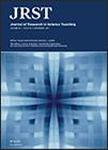版权所有:内蒙古大学图书馆 技术提供:维普资讯• 智图
内蒙古自治区呼和浩特市赛罕区大学西街235号 邮编: 010021

作者机构:Educ Dev Ctr Waltham MA 02453 USA
出 版 物:《JOURNAL OF RESEARCH IN SCIENCE TEACHING》 (科学教学研究杂志)
年 卷 期:2021年第58卷第4期
页 面:491-519页
核心收录:
基 金:National Science Foundation Division Of Research On Learning Direct For Education and Human Resources Funding Source: National Science Foundation
主 题:case studies hierarchical linear modeling middle school science and engineering practices science fairs
摘 要:Science fairs have a long history in the United States and internationally. Their implementation varies greatly (Kook et al, 2020), yet few empirical studies have examined the outcomes of these experiences for student learning. Research indicates that authentic scientific inquiry that focus on students agency in investigations can contribute to students learning (e.g., Houseal, Abd-El-Khalick, and Destefano, 2014). However, teachers have been challenged with implementing inquiry-based investigations (e.g., Anderson, 2007;Harris & Rooks, 2010). As new science standards increase the demand for science investigations in classrooms that afford students opportunities to engage with science and engineering practices (SEPs;NGSS Lead States, 2013), research is needed to understand the role of teachers and how these experiences can contribute to student learning. In this article, we describe the results of a national study that included data from 21 middle school science fairs. Data included observations of 20 science fairs, pre and postscience fair assessment data from 343 sixth grade students, and interviews or focus groups with 131 students, 122 teachers, 16 administrators, and 29 science fair judges. These data enabled the exploration of features of science fairs, including opportunities for students to engage in SEPs and the teachers support for SEPs through the science fair investigations. Findings reveal that science fair implementation varies considerably across schools. HLM analysis indicates that teachers support for critiquing practices, particularly when it included students engagement in evaluating the work of their peers, are positively associated with students understandings of SEPs. Qualitative findings highlight the ways in which teachers structured students experiences and supported their enactment of SEPs as they conducted their science fair investigations.